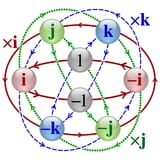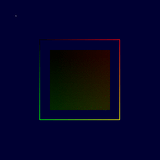>>16726618 (OP)
Axiomatic Syzygy Theory of Everything
Thesis Statement: all Axiomatic syzygies have identical transferrence function
Fundamental theorems:
Sum of Two Square Formula
2-dimensional analysis
Pythagorean Theorem
A^2 + B^2 = C^2
3-Dimensional Analysis
Trigonometric Identity Property
Let A = sine(x); B = cosine (x); C= 1
Translation:
1(^2) = sin^2(x) + cos^2(x)
1(^2) = sin(x)/csc(x) + cos(x)/sec(x)
1(^2) = 1/csc^2(x) + 1/sec^2(x)
4-Dimensional Analysis
Mass-Energy Equivalence Formula
Let sin(x) = mc^2, cos(x) = pc, 1 = E
Special note c = 1/g the inverse asymptotic limit of absolute time dilation at the schwartzschild radius of a black hole
Translation
E^2 = (mc^2)^2 + (pc)^2
E^2 = (m^2c^2/g^2) + (p(√c/g))^2
E^2 = (m/g^2)^2 + (p/g)^2
5-Dimensional analysis
Let sin(x) = Pride; cos(x) = Shame, csc(x) = Humility; sec(x) = Wisdom; 1 = Truth
Special Note; truth is invariant therefore all reciprocal inversions are presumably rationaled to rationalize denominator into the numerator where numerator is 1; mathematical operators for "+" , "-" , "x" , "/", and "=" are equivalent with the words "and", "without", "by", "of" and "is" respectively
Truth^2 = Pride/Humility + Shame/Wisdom
Invariant inversion
Truth^2 = Humility/Pride + Wisdom/Shame
Translation into philosophical expressions:
Truth is the Pride of Humility and the Shame of Wisdom
And the inverses are true as well:
Truth is the Humility of Pride and the Wisdom of Shame
So, when you get to 5-D, because all of the inverses are True as well, quaternions are used to rotate the Octohedronal structure because you can use quaternions to inverse the structure without things like
1^2 = 1/sec^2(x) + 1/csc^2(x)






